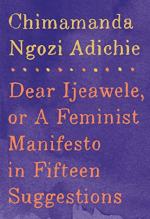
|
| Name: _________________________ | Period: ___________________ |
This test consists of 15 multiple choice questions and 5 short answer questions.
Multiple Choice Questions
1. What does Suggestion 7 state should never be considered an achievement?
(a) Friendship.
(b) Making money.
(c) Marriage.
(d) One's profession.
2. How does Adichie address homosexuality on Page 62?
(a) Igbo tradition goes against homosexuality, but Chizalum can do what she prefers.
(b) Some people are gay and that is fine.
(c) Some people are gay and some are not.
(d) Some people are gay, and they would be ostracized in Nigeria.
3. What point does Adichie make about the inequality of marriage proposals against her opposing "less than" feminsits?
(a) A man feels obligated to ask a woman when he is ready; he does not care if the woman says yes.
(b) A woman has to be asked first; the woman do not have the power.
(c) A man can stay with a woman as long as he wants without caring.
(d) A woman feels obligated to say yes when asked; men have the control.
4. According to Adichie at the end of Suggestion 15, what is one possible meaning of non-judgmental?
(a) I do not care about anything other than myself.
(b) I do not have an opinion about anything.
(c) I do not like to listen to others.
(d) I do not see the point of having opinions.
5. What does this self, identified by Adichie in Suggestion 8, look like in more descriptive terms?
(a) A self that takes care of a family and works.
(b) A self that is honest and aware of the equal humanity of other people.
(c) A self that is honest and aware of politics.
(d) A self that never holds back or backs down.
6. What does Adichie truly wish for Chizalum in relation to marriage?
(a) A relationship that is easy, supportive, and marriage is decided by the woman.
(b) A relationship that is comfortable, joy-filled, and marriage is a conversation.
(c) A relationship that is equal and blissful where marriage is not required.
(d) A relationship that fills her with happiness and is equal.
7. What types of aunties should Ijeawele surround Chizalum with, according to Adichie?
(a) Women who have many friends and speak their minds.
(b) Women who follow Igbo tradition and make good wives.
(c) Women who are educated and kind to others.
(d) Women who have qualities you would like her to admire.
8. What is pain traditionally linked to, as mentioned in Suggestion 10?
(a) School.
(b) Boys.
(c) Hair.
(d) Growth.
9. What does Adichie's friend, Chioma, tell her about being someone people want to be around?
(a) Chioma tells Adichie that people will like her if she is famous.
(b) Chioma tells Adichie to be outspoke and tell her truth no matter what.
(c) Chioma tells Adichie to be quiet and respectful.
(d) Chioma tells Adichie that people will not like something Adichie wants to say or do.
10. Why did Hilary Rodham Clinton eventually drop her maiden name?
(a) Because her husband forced her to.
(b) Because it is too confusing to voters.
(c) Due to political pressure.
(d) Because she did not like her maiden name.
11. Who capitalizes on how we teach girls to be?
(a) Older men.
(b) Older girls.
(c) Sexual predators.
(d) Parents.
12. What do people who are unkind and dishonest still deserve according to the beginning of Suggestion 14?
(a) Dignity.
(b) Kindness.
(c) Honesty.
(d) Help.
13. In Suggestion 10, how does Adichie say children learn?
(a) By example.
(b) By forging their own paths.
(c) By failing and learning from mistakes.
(d) By trial and error.
14. Adichie recognizes in Suggestion 14 that female goodness is as normal as what?
(a) Female wealth.
(b) Male oppression of women.
(c) Female evil.
(d) Male goodness.
15. At the end of Suggestion 12, what is the main argument Adichie makes about female periods?
(a) If periods lasted for a shorter period of time, women would have less live births.
(b) If periods did not last as long as they do, they would have too many children.
(c) If periods did not exist, women would have less children.
(d) If periods did not exist, the human species would not be here.
Short Answer Questions
1. What is an odd practice of marriage that most societies follow and Adichie thinks is a sign of inequality?
2. What type of woman can undermine feminism with her deceiving words and entitlement, according to the end of Suggestion 14?
3. In Suggestion 13, what does Adichie say we teach girls but not boys about love?
4. What part of African culture does Adichie believe needs to be taught as mentioned in Suggestion 9?
5. Where will Chizalum see mainstream world values of beauty?
|
This section contains 833 words (approx. 3 pages at 300 words per page) |

|




